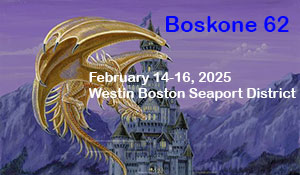One for the Morning Glory
by John Barnes
Tor, ISBN 0-312-86106-0, 1996, 319pp, US$22.95
“Drawing a pismire from his swash, he stepped over the corpse, leaned far out the window, and peered upward. A lone pigeon was still circling its way upward, as they will when they look for altitude and have a long way to go. It was barely more than a speck, and no one knew the limitations of a pismire better than Slitgizzard, but nonetheless he tested the lovelock, cocked the chutney, rested one wrist upon the other, held his breath, and squeezed the trigger very gently. The pismire spat fire. … The pigeon hit the parataxis and bounced onto the tiled roof of the clerihew, where it lay still.”
Well, I suppose one could say this takes place on an alternate world. Firstly, magic works, and secondly, the English language seems to have evolved differently. Barnes does violence to the language, yes, but measured, precise violence. If a pismire is a weapon here, it’s a weapon everywhere it’s mentioned. That’s part of what makes this book such a pleasure to read, but there is one drawback. This is NOT the book to give an adolescent. It’s not the violence, or the sex, but the vocabulary: it could have a permanent effect on her vocabulary, and not a good one.
The plot is a somewhat standard fantasy one of Prince Amatus and his four companions Golias, Mortis, Psyche, and the Twisted Man. They have to perform the usual sorts of tasks–fighting goblins, defeating the evil neighboring king, and so on–but have the additional problem that, as a result of a childhood accident, Prince Amatus is half invisible. Barnes knows the plot is standard. In fact, even his characters know it, and comment on it.
In spite of all this tongue-in-cheekiness, however, this is not a completely light-hearted fantasy. Good people have bad things happen to them, and good people die. Though Barnes does seem to reign back on the malapropisms during the more serious scenes, this still means the reader may at times be torn between the humorous tone and the serious content.
I am not a regular reader of fantasy, or at least not a reader of what I think of as “regular” fantasy. So when I say that ONE FOR THE MORNING GLORY is unusual, I could be wrong. But I found it a well- crafted variation on the usual fantasy mores. Whether or not you enjoy it will depend more on what you think of the use of language, though, than what you think of the story itself. (Two other books that did different things with language are RIDDLEY WALKER by Russell Hoban and FEERSUM ENDJINN by Iain M. Banks. I liked the former, but not the latter.)







 Donate to NESFA
Donate to NESFA